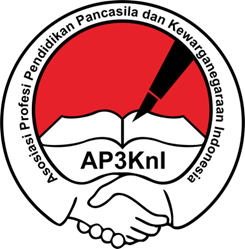A Study on Interactive–Based Learning Media to Strengthen the Profile of Pancasila Student in Elementary School
DOI: https://doi.org/10.26618/jed.v6i2.5591
National Cultural Diversity, Interactive Learning Media, Pancasila Student Profile, Elementary School
Abstract
This study aimed to determine the interactive-based learning media to strengthen the profile of Pancasila students in elementary schools. This type of research was literature study. The results showed that interactive-based learning media to strengthen the profile of Pancasila students in elementary schools can increase motivation in learning by the emergence of independent characters as a part of the character in the profile of Pancasila students in elementary schools. It was also seen as a facility in active learning for students to strengthen the profile of Pancasila students in elementary schools as well as to lead to a tendency to have a good character component. In addition, this learning media eased students to understand learning in term of strengthening the profile of Pancasila students in elementary schools by the emergence of the character of critical and creative reasoning. The use of the interactive –based learning media could build conducive and enjoyable learning atmosphere.
Penelitian ini bertujuan untuk mengetahui media pembelajaran berbasis interaktif untuk memperkuat profil pelajar pancasila di Sekolah Dasar. Jenis penelitian ini ialah kualitatif studi literatur. Hasil penelitian menunjukan jika media pembelajaran berbasis interaktif untuk memperkuat profil pelajar pancasila di Sekolah Dasar dapat 1) Meningkatkan motivasi dalam pembelajaran dengan munculnya karakter mandiri sebagai bagian karakter dalam profil pelajar pancasila di Sekolah Dasar. 2) Menjadi fasilitas dalam belajar aktif bagi siswa untuk memperkuat profil pelajar pancasila di Sekolah Dasar ialah mengarah pada kecendrungan kepemilikan komponen karakter yang baik. 3) Memudahkan siswa dalam memahami pembelajaran untuk memperkuat profil pelajar pancasila di Sekolah Dasar ialah dengan munculnya karakter nalar kritis dan kreatif. Penggunaan media pembelajaran berbasis interaktif dapat membangun suasana pembelajaran yang kondusif dan menyenangkan.
References
Arikunto, S. (2006). Prosedur Penelitian Suatu Pendekatan Praktek. Jakarta: PT. Rineka Cipta.
Barnawi., & Arifin, M. (2013). Mengelola Sekolah Berbasis Entrepreneurship. Yogyakarta: Ar Ruzz Media.
Cosner, S. (2020). A Deeper Look Into Next Generation Active Learning Designs for Educational Leader Preparation. Journal of Research on Leadership Education, 15(3), 167–172. https://doi.org/10.1177/1942775120936301
Direktorat Sekolah Dasar. (2020). Profil Pelajar Pancasila. Diambil dari http://ditpsd.kemdikbud.go.id/hal/profil-pelajar-pancasila
Fettahlıoğlu, P., Kaleci, D. (2018). Online argumentation implementation in the development of critical thinking disposition. Journal of Education and Training Studies, (6), 127–136.
Francisco, A., José, M., & Carmen, M. (2012). Interactive learning in operations management higher education: Software design and experimental evaluation. International Journal of Operations & Production Management, 32(12), 1395–1426. https://doi.org/10.1108/01443571211284160
Heinrich, W. F., Habron, G. B., Johnson, H. L., & Goralnik, L. (2015). Critical Thinking Assessment Across Four Sustainability-Related Experiential Learning Settings. Journal of Experiential Education, 38(4), 373–393. https://doi.org/10.1177/1053825915592890
Hidayah, Y., Dewi, D. A., & Trihastuti, M. (2021). The adaptation of scientific reasoning of prospective teachers for primary education in the perspective of civic science. Jurnal Civics: Media Kajian Kewarganegaraan. https://doi.org/10.21831/jc.v18i1.36916
Hidayah, Y., Halimah, L., Trihastuti, M., Dewie, D. A., Feriandi, Y. A., & Dianasari, D. (2020). How Did Prospective Elementary School Teacher Learn Citizenship Education during the Pandemic Covid-19 in Indonesia? IJERI: International Journal of Educational Research and Innovation, 15, 373–387.
Irwin, A., Jensen, T. E., & Jones, K. E. (2012). The good, the bad and the perfect: Criticizing engagement practice. Social Studies of Science, 43(1), 118–135. https://doi.org/10.1177/0306312712462461
Kompas.com. (2020). Apa Itu Pelajar Pancasila, Tujuan Sekolah Penggerak dari Nadiem Makarim. kompas.com. Diambil dari https://www.kompas.com/edu/read/2020/03/12/093000071/apa-itu-pelajar-pancasila-tujuan-sekolah-penggerak-dari-nadiem-makarim?page=all
Levy, S., & Gamboa, F. (2013). Quality Requirements for Multimedia Interactive Informative Systems. Journal of Software Engineering and Applications, 06, 416–425. https://doi.org/10.4236/jsea.2013.68051
Lickona., T. (1991). Educating for Character: How Our Schools Can Teach Respect and Responsibility. New York: Bantam.
Lombardi, D., & Shipley, T. F. (2021). The Curious Construct of Active Learning. Psychological Science in the Public Interest, 22(1), 8–43. https://doi.org/10.1177/1529100620973974
Moleong, L. J. (2011). Qualitative Research Methods. Revised Edition. Bandung: PT. Remaja Rosdakarya.
Mourad, A, Jurjus, A, Hussein, I. (2016). The what or the how: a review of teaching tools and methods in medical education. Med Sci Edu, 723–728.
Muhajir, N. (1996). Metodologi Penelitian Kualitatif. Yogyakarta: Rake Sarasin.
Nazir, M. (2013). Metode Penelitian. Bogor,: Ghalia Indonesia.
Nicol, A. A. M., Owens, S. M., Le Coze, S. S. C. L., MacIntyre, A., & Eastwood, C. (2017). Comparison of high-technology active learning and low-technology active learning classrooms. Active Learning in Higher Education, 19(3), 253–265. https://doi.org/10.1177/1469787417731176
Puspita, R. (2020). Mendikbud Jelaskan Anak Memiliki Profil Pelajar Pancasila. Republika.co.id. Diambil dari https://www.republika.co.id/berita/ql9sl4428/mendikbud-jelaskan-anak-memiliki-profil-pelajar-pancasila
Shaw, R. D. (2014). How Critical Is Critical Thinking? Music Educators Journal, 101(2), 65–70. https://doi.org/10.1177/0027432114544376
Soejono, & Abdurrahman. (1999). Metode Penelitian Suatu Pemikiran dan Penerapannya. Jakarta: Reneka Cipta.
Sulistyarini. (2015). PENGEMBANGAN KARAKTER BERBASIS PANCASILA MELALUI PENDIDIKAN KEWARGANEGARAAN. JURNAL BHINNEKA TUNGGAL IKA, 2(1).
Suresh, C., & Clinton, F. (2021). Employees’ identification and management control systems: a case study of modern policing. Accounting, Auditing & Accountability Journal, 34(1), 31–53. https://doi.org/10.1108/AAAJ-04-2020-4490
Wahab, A. A., & Sapriya. (2011). Teori dan landasan pendidikan kewarganegar-aan. Bandung: Alfabeta.
Wahab, R. (2016). Psikologi Belajar. Jakarta: PT RajaGrafindo Persada.
Wibowo, A. (2011). Pendidikan Karakter: Strategi Membangun KarakterBangsa Berperadaban. Yogyakarta: Pustaka Pelajar.
Zandvakili, E., Washington, E., Gordon, E. W., Wells, C., & Mangaliso, M. (2019). Teaching Patterns of Critical Thinking: The 3CA Model—Concept Maps, Critical Thinking, Collaboration, and Assessment. SAGE Open, 9(4), 2158244019885142. https://doi.org/10.1177/2158244019885142



